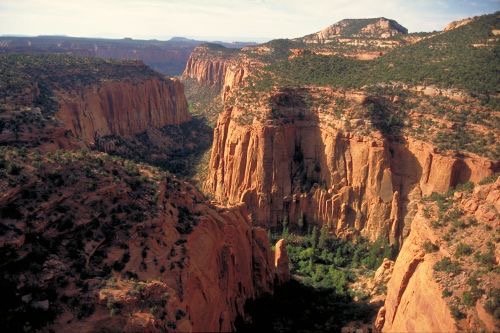To provide observations and information on the emerging fields of landscape scale conservation, heritage preservation, and sustainable community development.
Newsletter
Stay up-to-date with the latest nature, culture and community news.
We won’t spam you or share your information. Newsletters are sent approximately 10 times a year. Unsubscribe at any time.
Our Predictions for Living Landscapes in 2013: How Did We Do?
National Trust for Historic Preservation: A Tale of Two Sessions

What is in a name? The National Monument Version
National Monuments were once an obscure protected area designation. Today they are the big story in major news outlets. Reporters are struggling with names likes Bears Ears, Grand Staircase – Escalante, and Papahānaumokuākea Marine National Monument. What put these places in the headlines was the new administration’s signature on an Executive Order authorizing a review all National Monuments designated since January 1, 1996 and specifically those over 100,000 acres. The rush is on to learn more about national monuments.

Take Notice: Trending for Large Landscapes
Every two years protected area managers, scientists, and every kind of experts on cultural and natural heritage gather at the George Wright Conference to present papers, engage in lively discussions and swap professional gossip at the bar. I always find these meetings to be the place to spot emerging ideas in the field. The 2017 meeting in Norfolk VA was no exception. So what is trending for large landscapes?

Federal Budget: First Look is not Promising
On March 16, 2017 the Whitehouse released its budget framework styled America First: A Budget Blueprint to Make America Great Again and the news was not great for programs that support large landscape conservation. For the FY 2018 the Department of Interior faces a proposed 12 % budget reduction and the Environmental Protection Agency is facing a 31% reduction. In general this brief document does not identify where the pain will fall except on the often pummeled National Heritage Areas. And while only the first step in the budget process, this proposal needs to be taken seriously.

Thinking About Heritage Tourism
With a global market of 1 billion travelers, how can heritage managers draw more travelers into a deeper engagement around the understanding of place and more importantly the people who live in a place. Can another approach the found that goes beyond just consumer driven products sometimes characterized as hit and run tourism? A recent conference and a visit to two World Heritage cities, provided an opportunity for reflection.

US National Parks on the Southern Border
The landscape of the southern boundary of the United States is complex and evolving. Read three vignettes of the current conditions facing the National Parks in carrying out their mission on the border. Recent proposals to harden the infrastructure of the border, for example to build a wall, and to increase militarization and enforcement will not make accomplishing the agency’s mission any easier.

What is in a name? The National Monument Version
National Monuments were once an obscure protected area designation. Today they are the big story in major news outlets. Reporters are struggling with names likes Bears Ears, Grand Staircase – Escalante, and Papahānaumokuākea Marine National Monument. What put these places in the headlines was the new administration’s signature on an Executive Order authorizing a review all National Monuments designated since January 1, 1996 and specifically those over 100,000 acres. The rush is on to learn more about national monuments.

Take Notice: Trending for Large Landscapes
Every two years protected area managers, scientists, and every kind of experts on cultural and natural heritage gather at the George Wright Conference to present papers, engage in lively discussions and swap professional gossip at the bar. I always find these meetings to be the place to spot emerging ideas in the field. The 2017 meeting in Norfolk VA was no exception. So what is trending for large landscapes?

Federal Budget: First Look is not Promising
On March 16, 2017 the Whitehouse released its budget framework styled America First: A Budget Blueprint to Make America Great Again and the news was not great for programs that support large landscape conservation. For the FY 2018 the Department of Interior faces a proposed 12 % budget reduction and the Environmental Protection Agency is facing a 31% reduction. In general this brief document does not identify where the pain will fall except on the often pummeled National Heritage Areas. And while only the first step in the budget process, this proposal needs to be taken seriously.

Thinking About Heritage Tourism
With a global market of 1 billion travelers, how can heritage managers draw more travelers into a deeper engagement around the understanding of place and more importantly the people who live in a place. Can another approach the found that goes beyond just consumer driven products sometimes characterized as hit and run tourism? A recent conference and a visit to two World Heritage cities, provided an opportunity for reflection.

US National Parks on the Southern Border
The landscape of the southern boundary of the United States is complex and evolving. Read three vignettes of the current conditions facing the National Parks in carrying out their mission on the border. Recent proposals to harden the infrastructure of the border, for example to build a wall, and to increase militarization and enforcement will not make accomplishing the agency’s mission any easier.


